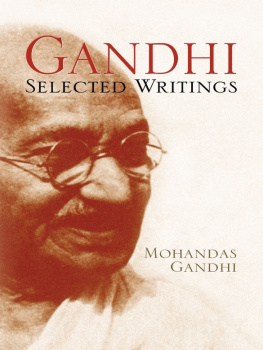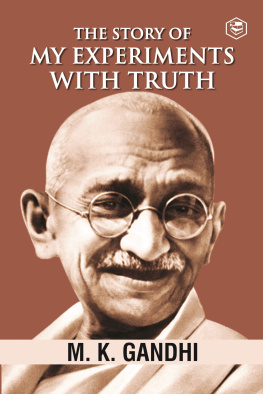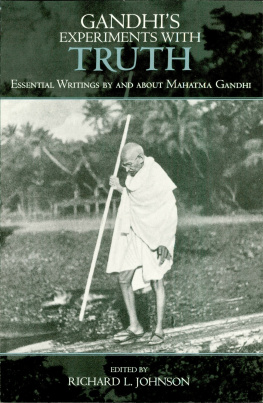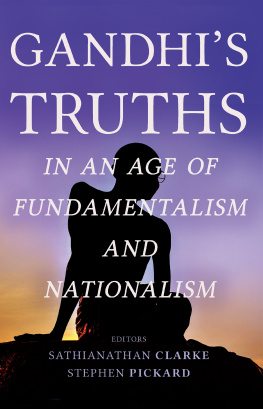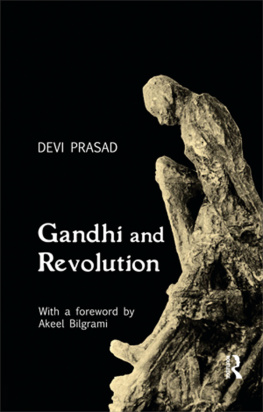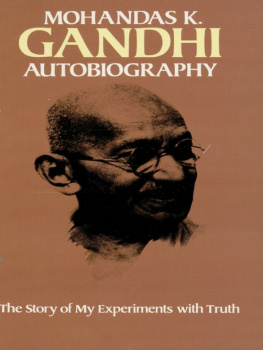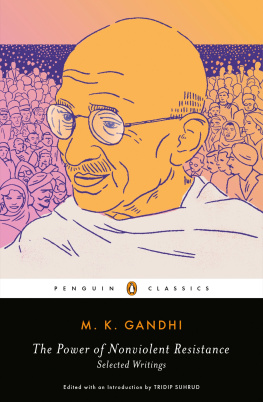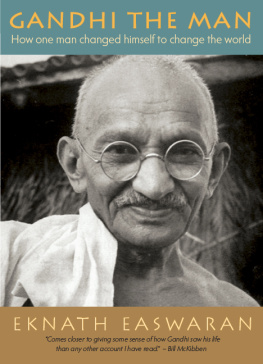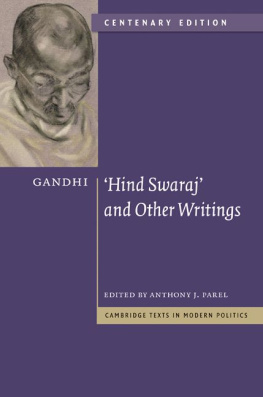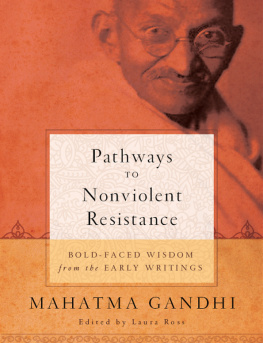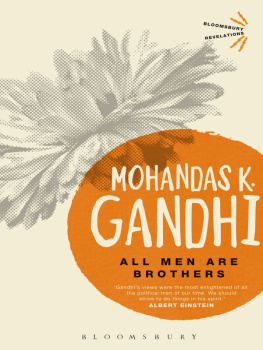Mohandas Gandhi - Gandhi: Selected Writings
Here you can read online Mohandas Gandhi - Gandhi: Selected Writings full text of the book (entire story) in english for free. Download pdf and epub, get meaning, cover and reviews about this ebook. year: 2012, publisher: Dover Publications, genre: Science. Description of the work, (preface) as well as reviews are available. Best literature library LitArk.com created for fans of good reading and offers a wide selection of genres:
Romance novel
Science fiction
Adventure
Detective
Science
History
Home and family
Prose
Art
Politics
Computer
Non-fiction
Religion
Business
Children
Humor
Choose a favorite category and find really read worthwhile books. Enjoy immersion in the world of imagination, feel the emotions of the characters or learn something new for yourself, make an fascinating discovery.
- Book:Gandhi: Selected Writings
- Author:
- Publisher:Dover Publications
- Genre:
- Year:2012
- Rating:3 / 5
- Favourites:Add to favourites
- Your mark:
- 60
- 1
- 2
- 3
- 4
- 5
Gandhi: Selected Writings: summary, description and annotation
We offer to read an annotation, description, summary or preface (depends on what the author of the book "Gandhi: Selected Writings" wrote himself). If you haven't found the necessary information about the book — write in the comments, we will try to find it.
This anthology of Gandhis writings offers a revealing look at his life and philosophy, focusing on subjects of enduring interest rather than day-to-day political matters and the development of the philosophy of Satyagraha defense of and by the truth. This collection also features significant excerpts from the Mahatmas speeches, correspondence, and diaries.
Gandhi: Selected Writings — read online for free the complete book (whole text) full work
Below is the text of the book, divided by pages. System saving the place of the last page read, allows you to conveniently read the book "Gandhi: Selected Writings" online for free, without having to search again every time where you left off. Put a bookmark, and you can go to the page where you finished reading at any time.
Font size:
Interval:
Bookmark:
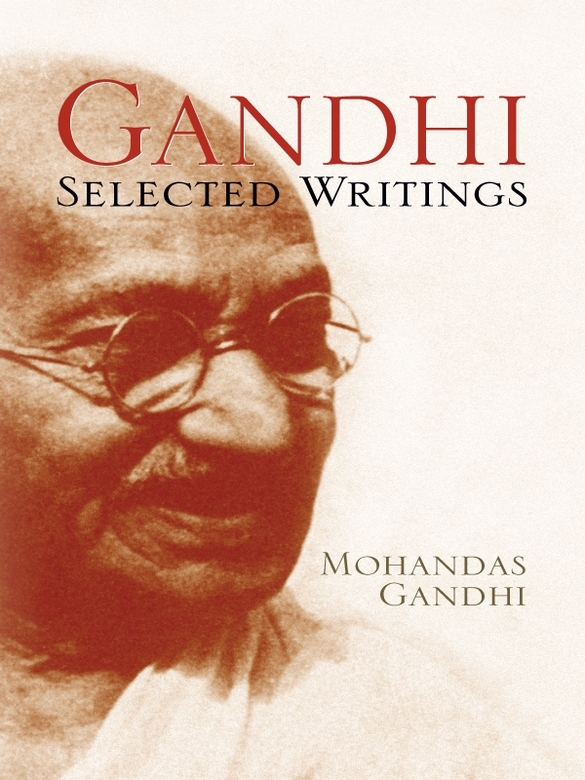
T he Editor wishes to acknowledge with gratitude the assistance he has received from Admiral Earl Mountbatten T of Burma, the High Commissioner for India, Mr. Devedas Gandhi and Shri Pyaralel, in collecting this material; and also the permission to reprint it, obtained from the Nawagivan Trust, The Marquess of Linlithgow and Sir Robert Tottenham.
The frontispiece is reproduced by courtesy of His Excellency the High Commissioner for India.
BOOKS BY MAHATMA GANDHI
An Autobiography, or The Story of My Experiments with Truth (Navagivan Publishing House, Ahmedabad, 1927).
From Yeravda Manir (Navagivan, 1932).
Self-Restraint v. Self-Indulgence (Navagivan, 1947).
The Nations Voice (Navagivan, 1932).
Non-Violence in Peace and War (Navagivan, 1942).
Delhi Diary (Navagivan, 1942)
Speeches and Writings (Nateson & Co., Madras)
Women and Social Injustice (Navagivan, 1942).
Young India, Vols. I and II (Ganesan Ltd., Madras, 1922).
Young India, Vol. III (Ganesan Ltd., Madras, 1924).
Songs from Prison (Allen & Unwin Ltd., London, 1934).
Key to Health (Navagivan, 1948).
Hind Swaraj (Navagivan, 1936).
Satyagraha in South Africa.
Cent per Cent Swadeshi.
Constructive Programme: Its Meaning and Place (Navagivan, 1941).
Gandhijis Correspondence with the Government, 1942-4 (Navagivan).
The Indian States Problem (Navagivan)
Status of Indian Princes (Navagivan).
Glances at Islam (Navagivan).
To Women (Navagivan).
The Epic Fast (Navagivan).
Christian Missions-Their Place in India (Navagivan).
A Survey of Mata Taluka (Navagivan).
The India of My Dreams (Hind & Tabs, 1949).
Mahadev Descri , The Story of Bardoli (Navagivan, 1929).
Rajendia Prasad, Constructive Programme (Navagivan, 1942).
K. G. Mashruuala, Practical Non-Violence (Navagivan, 1941).
Richard B. Gregg, A Discipline for Non-Violence (Navagivan, 1941).
Richard B. Gregg, Economics of Khadar (Navagivan, 1946).
J. C. Kumarappa, Clue to Keynes (Navagivan, 1947).
J. C. Kumarappa, Practice and Precepts of Jesus (Navagivan, 1945).
J. C. Kumarappa, Christianity Its Economy and Way of Life (Navagivan, 1945)
S. K. George, Gandhis Challenge to Christianity (Navagivan, 1947).
N. K. Bose, Selections from Gandhi (Navagivan, 1948).
Manubehn Gandhi, Bapu My Mother (Navagivan, 1949).
Mahadev Desai, The Gita According to Ghandi; with M. K. Gandhi, Anasahit Yoha (Navagivan, 1946).
N ow about the message of the Gita.
Even in 1888-9, when I first became acquainted with the Gita, I felt that it was not an historical work, but that, under the guise of physical warfare, it described the duel that perpetually went on in the hearts of mankind, and that physical warfare was brought in merely to make the description of the internal duel more alluring. This preliminary intuition became more confirmed on a closer study of religion and the Gita. A study of the Mahabharata gave it added confirmation. I do not regard the Mahabharata as an historical work in the accepted sense. The Adiparva contains powerful evidence in support of my opinion. By ascribing to the chief actors superhuman or subhuman origins, the great Vyasa made short work of the history of kings and their peoples. The persons therein described may be historical, but the author of the Mahabharata has used them merely to drive home his religious theme.
The author of the Mahabharata has not established the necessity of physical warfare; on the contrary he has proved its futility. He has made the victors shed tears of sorrow and repentance, and has left them nothing but a legacy of miseries.
In this great work the Gita is the crown. Its second chapter, instead of teaching the rules of physical warfare, tells us how a perfected man is to be known. In the characteristics of the perfected man of the Gita I do not see any to correspond to physical warfare. Its whole design is inconsistent with the rules of conduct governing the relations between warring parties.
Krishna of the Gita is perfection and right knowledge personified; but the picture is imaginary. That does not mean that Krishna, the adored of his people, never lived. But perfection is imagined. The idea of a perfect incarnation is an aftergrowth.
In Hinduism, incarnation is ascribed to one who has performed some extraordinary service of mankind. All embodied life is in reality an incarnation of God, but it is not usual to consider every living being an incarnation. Future generations pay this homage to one who, in his own generation, has been extraordinarily religious in his conduct. I can see nothing wrong in this procedure. It takes nothing from Gods greatness, and there is no violence done to Truth. There is an Urdu saying which means, Adam is not God but he is a spark of the Divine. And therefore he who is the most religiously behaved has most of the divine spark in him. It is in accordance with this train of thought, that Krishna enjoys, in Hinduism, the status of the most perfect incarnation.
This belief in incarnation is a testimony of mans lofty spiritual ambition. Man is not at peace with himself till he has become like unto God. The endeavour to reach this state is the supreme, the only ambition worth having. And this is self-realization. This self-realization is the subject of the Gita, as it is of all scriptures. But its author surely did not write it to establish that doctrine. The object of the Gita appears to me to be that of showing the most excellent way to attain self-realization. That which is to be found, more or less clearly, spread out here and there in Hindu religious books, has been brought out in the clearest possible language in the Gita even at the risk of repetition.
That matchless remedy is renunciation of fruits of action.
This is the centre round which the Gita is woven. This renunciation is the central sun, round which devotion, knowledge and the rest revolve like planets. The body has been likened to a prison. There must be action where there is body. Not one embodied being is exempted from labour. And yet all religions proclaim that it is possible for man, by treating the body as the temple of God, to attain freedom. Every action is tainted, be it ever so trivial. How can the body be made the temple of God? In other words how can one be free from action, i.e. from the taint of sin? The Gita has answered the question in decisive language: By desireless action; by renouncing fruits of action; by dedicating all activities to God, i.e. by surrendering oneself to Him body and soul.
But desirelessness of renunciation does not come for the mere talking about it. It is not attained by an intellectual feat. It is attainable only by a constant heart-churn. Right knowledge is necessary for attaining renunciation. Learned men possess a knowledge of a kind. They may recite the Vedas from memory, yet they may be steeped in self-indulgence. In order that knowledge may not run riot, the author of the Gita has insisted on devotion accompanying it and has given it the first place. Knowledge without devotion will be like a misfire. Therefore, says the Gita, Have devotion, and knowledge will follow. This devotion is not mere lip worship, it is a wrestling with death. Hence the Gitas assessment of the devotees qualities is similar to that of the sages.
Thus the devotion required by the Gita is no soft-hearted effusiveness. It certainly is not blind faith. The devotion of the Gita has the least to do with externals. A devotee may use, if he likes, rosaries, forehead marks, offerings, but these things are no test of his devotion. He is the devotee who is jealous of none, who is a fount of mercy, who is without egotism, who is selfless, who treats alike cold and heat, happiness and misery, who is ever forgiving, who is always contented, whose resolutions are firm, who has dedicated mind and soul to God, who causes no dread, who is not afraid of others, who is free from exultation, sorrow and fear, who is pure, who is versed in action and yet remains unaffected by it, who renounces all fruit, good or bad, who treats friend and foe alike, who is untouched by respect or disrespect, who is not puffed up by praise, who does not go under when people speak ill of him, who loves silence and solitude, who has a disciplined reason. Such devotion is inconsistent with the existence at the same time of strong attachments.
Font size:
Interval:
Bookmark:
Similar books «Gandhi: Selected Writings»
Look at similar books to Gandhi: Selected Writings. We have selected literature similar in name and meaning in the hope of providing readers with more options to find new, interesting, not yet read works.
Discussion, reviews of the book Gandhi: Selected Writings and just readers' own opinions. Leave your comments, write what you think about the work, its meaning or the main characters. Specify what exactly you liked and what you didn't like, and why you think so.

